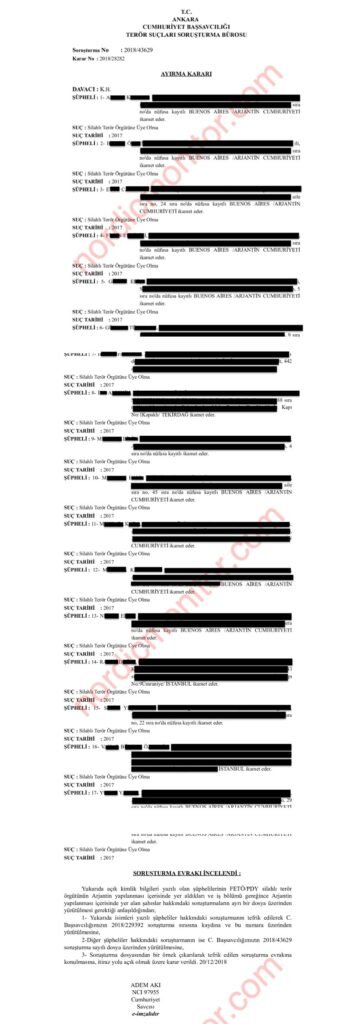Judicial documents have confirmed that Turkish educators, representatives of local associations and businessmen living in Argentina were profiled by Turkish diplomats and reported to the Foreign Ministry in Ankara, according to Nordic Monitor.
The information was later used in an indictment on charges of terrorism by a Turkish prosecutor.
According to a December 20, 2018 decision by prosecutor Adem Akıncı, the Ankara Chief Public Prosecutor’s Office launched a separate investigation (file no. 2018/43629 ) into 17 critics of Turkish President Recep Tayyip Erdoğan in Argentina who were listed in espionage files dispatched by Turkish diplomats in the country without any concrete evidence of wrongdoing.
According to the documents they were charged with “membership in a terrorist group.” The investigation was based on spying files created at the Turkish Embassy in Buenos Aires between 2016 and 2018.
As a side note, Akıncı, who led the investigation into the assassination of Russian Ambassador Andrei Karlov in December 2016, was accused of suppressing the evidence that the killer had links to various jihadist groups including al-Qaeda and was radicalized by several pro-government imams, including two who worked for the government religious authority, the Diyanet. Nordic Monitor previously reported that several suspects told the court that Akıncı had forced them to testify during interrogation that the assassination was directed by the Gülen movement. They were later jailed after declining the prosecutor’s request to testify to that in court.
Critics of the Erdoğan government abroad, especially members of the, have been facing surveillance, harassment, death threats and abduction since President Erdoğan decided to scapegoat the group for his own legal troubles. They have often been denied consular services such as power of attorney and birth registry as well as having their passports revoked. Their assets in Turkey are seized and their family members at home risk criminal charges.
Judicial document dated December 20, 2018 reveals spying on critics in Argentina by Turkish diplomatic missions. (The addresses and names of the Turkish nationals have been redacted for security reasons):
The profiling files were conveyed to the foreign ministry by Meral Barlas, the Turkish ambassador in Buenos Aires between 2016 and 2018.
As previously disclosed by Nordic Monitor, the foreign ministry sent lists of profiled Turkish nationals in two CDs to the Ankara Chief Public Prosecutor’s Office, the national police and Turkey’s intelligence agency MIT on February 19, 2018 via an official document for further administrative or legal action, the punishment of their relatives back in Turkey and the seizure of their assets.
Public prosecutor Akıncı, who received the foreign ministry document on February 23, 2018, forwarded the classified CDs including information on 4,386 Erdoğan critics to the organized crime unit of the Ankara Police Department for further action. The police conveyed the results of its investigations to the public prosecutor.
According to judicial documents released by the Ankara 4th High Criminal Court on January 16, 2019, the foreign ministry compiled a long list of foreign entities that were owned and/or operated by people who were seen as close to the Gülen movement.
Moreover, Nordic Monitor revealed how MİT infiltrated refugee camps in Greece in order to spy on opponents who were forced to flee to Greece to escape an unprecedented crackdown in neighboring Turkey.
In the aftermath of a coup attempt in Turkey on July 15, 2016, some Western countries investigated the intelligence activities of Turkish Foreign Ministry personnel, representatives from relevant authorities, imams and intelligence officers accredited as diplomats.
In 2018 the Swiss attorney general launched a criminal inquiry into spying on Switzerland’s Turkish community by Turkish diplomats. The Swiss foreign ministry confirmed that the accusations outlined in the criminal proceedings were not diplomatic tasks and that therefore the people concerned could not avail themselves of immunity. Two of them had to leave Switzerland as a result of the investigation.
In December 2016 Turkey had to recall Yusuf Acar, the religious affairs attaché at the Turkish Embassy in The Hague, after Dutch authorities accused him of gathering intelligence on the movement. Similarly, Belgian authorities rejected the visa applications of 12 Turkish imams seeking to work in the country in 2017. The government of the central German state of Hessen ended its cooperation with the Turkish-Islamic Union for Religious Affairs (Diyanet İşleri Türk İslam Birliği, or DİTİB).
Foreign Minister Mevlüt Çavuşoğlu confirmed systematic spying on Turkish government critics on foreign soil as by Turkish diplomatic missions in February, 2020. Çavuşoğlu said Turkish diplomats assigned to embassies and consulates have officially been instructed by the government to conduct such activities abroad. “If you look at the definition of a diplomat, it is clear. … Intelligence gathering is the duty of diplomats,” Çavuşoğlu told Turkish journalists on February 16, 2020 following the Munich Security Conference, adding, “Intelligence gathering and information collection are a fact.”
















